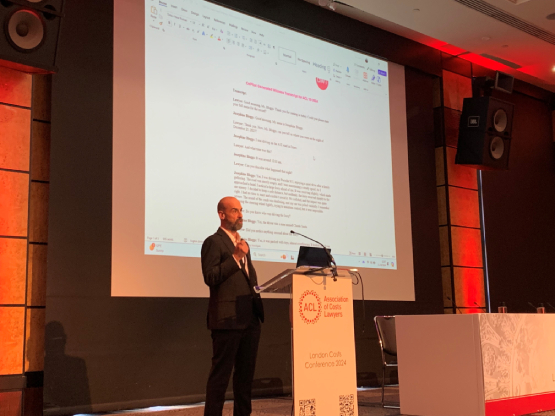ACL conference told that those using AI will take the jobs of those who don’t

Artificial intelligence (AI) is not ready to replace Costs Lawyers, but “those using AI will take the jobs of those doing the same task without it”, a leading practitioner predicted last week.
Costs Lawyer Simon Murray, a partner and head of insurance business services at national firm DWF, told the ACL Conference in London last week that he also expected the hourly rate to either adapt or disappear in the face of AI.
His view was that using AI was becoming an “absolute necessity”.
“Costs Lawyers are an entrepreneurial bunch,” he said, urging colleagues not to be afraid of this new technology. AI actually “democratises” technology” – because it uses natural language, “you do not have to be a programmer or coder” and so lawyers do not need in-house IT teams to develop it.
He explained to delegates what the technology was and how it worked. He said nobody knew when “artificial general intelligence” – systems that can perform any task that a human can do across multiple domains, rather than just specific tasks – would be able to do “pretty much everything better than a human being”, but he reckoned it could be in the next decade.
The law, he continued, was “especially exposed” to it. Language was “the tool of the lawyer”, meaning large language models underpinning the new wave of AI were, by definition, going to work in the law.
Mr Murray pointed to legal AI company Harvey recently raising $100m, valuing the company at $1.5bn. The funding round was led by Google Ventures, with other investors including ChatGPT creator OpenAI. “That gives you an indication of how much the investors in these tools think there is available in the law in terms of revenue… You can absolutely guarantee they’re expected to get that back in multiples.”
Mr Murray encouraged Costs Lawyers to test what AI could do – with the caveat that, if using publicly available products, they should not use confidential or privileged information. Basic AI tools aimed at legal costs were available, he said, with suppliers developing more advanced versions, as were law firms in-house.
He did a live test at the conference using Microsoft’s Copilot – not one specifically trained on the law – and showed how it was capable of providing legal insight and specifically helping with costs work.
First it turned a transcript between a lawyer and a client into a witness statement, a first draft that “gets you a long way”. It was about 60% accurate, Mr Murray said. He then asked it to create points of dispute, referring to relevant case law, and again received a good first draft.
Mr Murray said the courts would expect AI to become commonplace “and that will be reflected in amounts they allow”.
So what would that mean for the hourly rate? “Bearing in mind the speed at which you can create documentation, the speed at which you can do various tasks, I think probably on balance the hourly rate will struggle to survive in its current form. So either it will morph or it will disappear,” he said.
Meanwhile, in a speech on Wednesday to the Legal Geek event in London, Sir Geoffrey Vos, the Master of the Rolls, noted how the power of AI was growing rapidly.
“The LLMs of today are only the start. Much more powerful tools will soon be available. When they are, they will be able to advise on and even resolve, at least some, legal questions as well as humans, far more quickly and far more cheaply.
“Whilst lawyers and judges will want to retain complete human oversight of the use of these technologies, they will, I suspect, not actually be able, without spending masses of time and money, to check the work of the AI.
“Citizens will surely use these AI tools in practice to get legal advice and will surely want justice delivered more speedily and efficiently by the use of them. If lawyers and judges refuse to adopt them, they will be left behind. Once the human lawyer or judge is faced with something that may take days to check – or simply be uncheckable – what choice do they have but to accept the advice or verdict of the machine?”
This was a serious problem for the future, Sir Geoffrey said. “It will not arise due to malign use of AI, but from an inevitable commercial and perhaps human imperative to allow citizens and business to achieve what they want and need – namely effective legal solutions – more quickly and efficiently than humans can achieve.
“And this problem affects every other consumer, financial and industrial sector in much the same way that it affects law, lawyers and judges. This is the problem that requires our urgent attention.”
